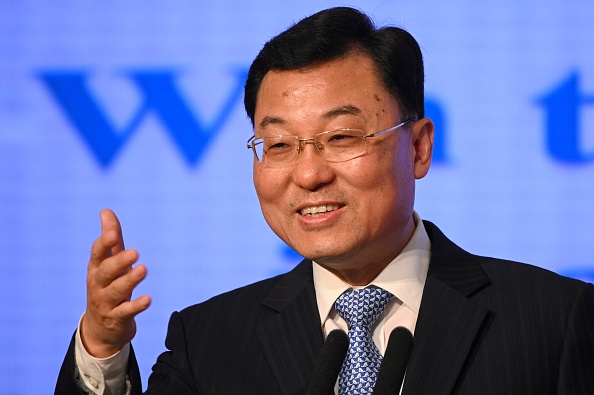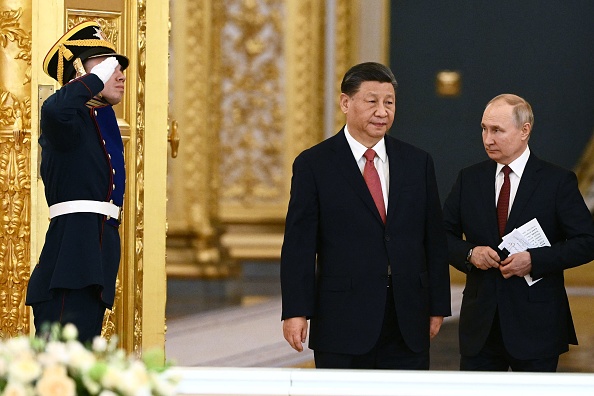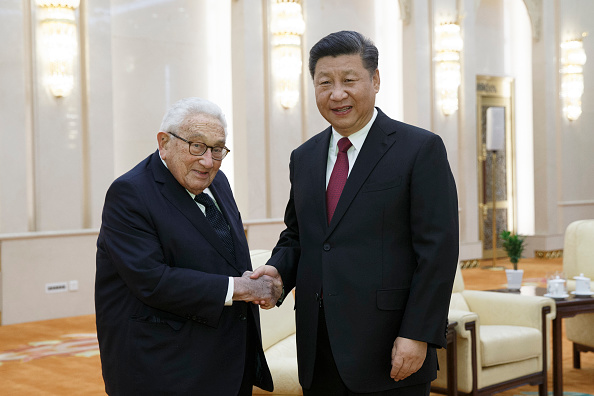
 New Diplomat in Town
New Diplomat in TownChina's new ambassador to the U.S., Xie Feng, has arrived in Washington against a backdrop of fraught bilateral tensions. However, both the U.S. and Chinese governments have indicated that they want to put relations between their two nations back on track.
Xie claims he intends to improve U.S.-China relations, saying that "we hope that the United States will work together with China to increase dialogue, to manage differences and also to expand our cooperation so that our relationship will be back to the right track."
Xie previously served as vice foreign minister and is the successor to Qin Gang, who left Washington in January to become China's foreign minister.
Xie's remarks follow a two-day meeting earlier this month in Vienna between national security adviser Jake Sullivan and China's top diplomat, Wang Yi, that the two sides described as "candid, substantive, and constructive."
And at the G7, President Joe Biden surprised his audience by saying that tensions with China are going to "begin to thaw very shortly."
However, experts have noted that actions speak louder than words. Biden and the other G7 leaders wrote their first joint statement of principles outlining how they would resist economic blackmail and dissuade China from threatening or invading Taiwan, while also reassuring Beijing that they were not seeking confrontation.
Commerce Secretary Gina Raimondo will also soon sit down with her Chinese counterpart, Wang Wentao in the first cabinet-level meeting in Washington between the two countries during the Biden administration, a sign that the two sides may still yet come together.
Learn more in "Keep the Lines of Communication Open," by An Gang, an Adjunct Fellow at the Center for International Security and Strategy, Tsinghua University.
 Strengthening Cooperation
Strengthening CooperationAs China seeks to play the role of peacemaker in Ukraine, it held yet another high-level meeting with a Russian leader, signaling continued engagement with Moscow.
Chinese President Xi Jinping met with Russian Prime Minister Mikhail Mishustin to further bolster their economic, political and military ties, and offered firm, mutual support to Russia on matters of core interests.
Xi said that in addition to strengthening cooperation in multilateral platforms such as the United Nations, the Shanghai Cooperation Organisation, and the Group of 20, China and Russia should explore "potential" new economic, trade and investment links.
China and Russia have recently increased their economic cooperation and diplomatic contacts and deepened the strategic partnership since the start of the Russia-Ukraine conflict.
During the visit, both leaders offered firm words of warning over U.S. attempts to contain their growth.
"Our countries together oppose the attempts of the collective West to maintain global dominance and use illegal sanctions to impose their will on independent states," Mishustin said at the meeting.
Learn more in "Playing Peacemaker," an interview with Richard Weitz, a Washington, DC-based analyst of international affairs.
 Diplomatic Legacy
Diplomatic LegacyHenry Kissinger, the renowned diplomat and strategist, is turning 100. Tomorrow, May 27, marks this significant milestone for one of the most influential figures in 20th-century international relations.
His enduring legacy includes notable achievements in U.S.-China relations, exemplified by the historic visit of President Nixon to Beijing in 1972, hailed as the "week that changed the world." This breakthrough not only thawed previously strained relations but also had profound implications for international diplomacy, reshaping the global geopolitical landscape.
Kissinger's ongoing insights on preventing global conflicts remain relevant today. He recently emphasized the vital role of diplomacy and international cooperation in maintaining global stability and averting potential conflicts.
Furthermore, Kissinger predicts that China's involvement in Ukraine peace talks could be instrumental in fostering a peaceful resolution. Recognizing China's status as a major global power, he believes its influence could help stabilize the situation in Ukraine.
Addressing concerns about the future of Sino-American relations and the risk of a potential World War III, Kissinger highlights the need for strategic cooperation and responsible management of artificial intelligence (AI) to prevent a destructive conflict between the United States and China.
Looking ahead, diplomacy and statesmanship will continue to be crucial in establishing a new paradigm for the 21st century that avoids the catastrophic conflicts witnessed in the previous century, according to Kissinger. He states the world is currently facing "an unprecedented challenge and great opportunity." As current world leaders shoulder the weight of geopolitical challenges, diplomatic engagement and cooperation are crucial in preventing global conflicts and fostering peaceful resolutions.
Prepared by China-US Focus editorial teams in Hong Kong and New York, this weekly newsletter offers you snap shots of latest trends and developments emerging from China every week, while adding a dose of historical perspective.
- 2023-05-19 More than Words
- 2023-05-12 Meeting Halfway
- 2023-05-05 Golden Week
- 2023-04-28 Diplomatic Dance
- 2023-04-21 Constructive and Fair
- 2023-04-14 Shoulder-to-Shoulder
- 2023-04-07 Push and Pull
- 2023-03-31 Tsai in Transit
- 2023-03-24 A Changing World
- 2023-03-17 Peacemaker Xi
- 2023-03-10 Party Time
- 2023-03-03 “An Existential Struggle”
- 2023-02-24 Opposing Worldviews
- 2023-02-17 Ripple Effects
- 2023-02-10 Ballooning Tensions
- 2023-02-03 Hot Air
- 2023-01-27 Spheres of Influence
- 2023-01-20 China's Davos Pitch
- 2023-01-13 Strategic Encounters
- 2023-01-06 Common Challenges